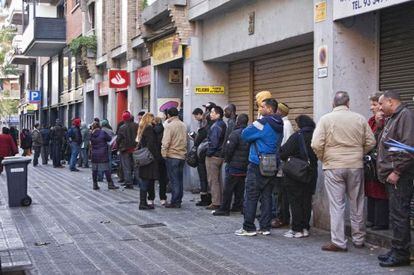“Which river runs between Madrid and Barcelona?”
Civil registries include trick questions in tests for foreigners seeking Spanish nationality


Foreigners looking to obtain Spanish nationality are having to display an increasingly wide array of knowledge. Among the questions recently added to cultural tests that applicants have had to take at some civil registries – such as the one in Barcelona – are linguistic posers, such as: “Give the present indicative of the verb oír [to hear],” as well as trick questions, such as: “Which river runs between Madrid and Barcelona?” (Answer: there isn’t one.)
I would like to know if a Spaniard could pass this test”
Olga Hernández, from the Catalan Association of Immigration Professionals
State law does not stipulate that foreigners seeking Spanish citizenship have to be submitted to a test, but it does say that authorities should evaluate their level of integration in the country. Judges in charge of some provincial civil registries have thus decided to make applicants sit a brief written test featuring questions on a range of subjects: geography, the organization of the state, history, culture and language.
It is a move that has angered professionals who work in the area. “It is not about evaluating each person’s cultural level, but rather their integration. We cannot confuse the two,” says Olga Hernández, member of the Catalan Association of Immigration Professionals (ACPE), which has compiled and provided answers to more than 200 questions to help immigrants pass the test.
“Many still don’t know that they have to answer a test. Although there is no time limit, they suffer, they start to sweat…,” says Hernández.
Questions for aspiring Spaniards
Geography. "Name five Spanish islands." "Name five comarcas [administrative districts] in Catalonia." "List five cities in the north and five in the south of Spain." "What provinces make up Andalusia?" "Name three regions made up of just one province." "Where are Cádiz, Pamplona and Oviedo?"
State organization. "When is Constitution Day?" "Define article 149 of the Constitution. What does it say?" "When are local elections held?" "What are the roles of the head of state?" "What is the role of the government delegates?" "Name the Princess of Asturias." "Name the President of the Municipalities Federation."
History. "Name five kings of Spain." "Who won the Civil War?" "Since which year has Madrid been the capital of Spain?"
Culture. "How are holidays in Spain celebrated?" "Explain what a tortilla de patatas, a cocido madrileño and a paella valenciana consist of." "What are the ingredients of paella?" "Name three postwar Spanish writers." "List three Spanish novels that you have read." "What is Adif?" "Name the director general of the police." "Name some archeological sites in Spain." "Name the secretary general of Podemos." "Who is Bárcenas?"
'Trick' questions. "Who decides on a child's education – the father or the mother?" "What taxes do foreigners have to pay?" "Do you meet up more with foreign or Spanish friends? "Which river joins Barcelona and Madrid?"
The questions bring back memories of school and the tension of surprise exams: “List three rivers of the Castilian Meseta;” “Name three regions with just one province;” “In which cities would you find the Guggenheim, Picasso and Thyssen museums?” These are all questions people have been asked at registries in Barcelona in recent weeks.
Other questions seem more aimed at someone studying for a civil service exam: “What is the role of the government delegates?” “Define article 149 of the Spanish Constitution. What does it say?”
Applicants are regularly failing the exam, say lawyers, which has an impact when it comes to evaluating their level of integration and granting or denying nationality. The draft registries reform bill proposes that in the future all those seeking Spanish citizenship will have to pass an official exam. Organizations such as ACPE believe that right now the practice of submitting applicants to questions of a certain degree of difficulty is “unfair and arbitrary” and does not allow them to measure a foreign person's degree of integration. “I would like to know if a Spaniard could pass this test,” Hernández says.
The exams usually consist of between 10 and 15 questions and, on occasions, include trick questions. ACPE has detected examples such as “Who decides on a child’s education – the father or the mother?” Or, “What taxes do foreigners in Spain have to pay?” – which falsely implies that there are specific taxes for non-Spaniards.
Beyond the test, authorities evaluate applicants’ degrees of integration by asking them things such as whether they have more of a relation with Spanish friends or with those from their own country, what their reasons for living in Spain are, or what they think they can contribute to the country.










































